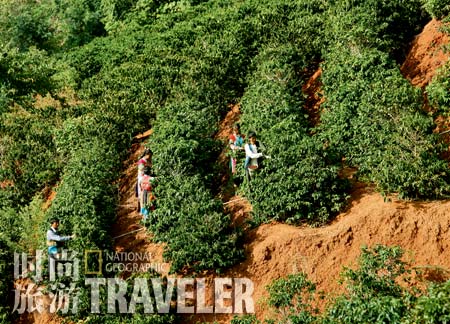Tian Daishi: working memories of Organic Coffee Farm

The memory of Life-- Tian Daishi
In the shade of the kapok trees in the courtyard, a table covered with Yunnan batik blue tablecloth is equipped with utensils for brewing and drinking coffee. The workers in the coffee farm sit here during the afternoon break to drink the fresh coffee produced that year, and the aroma is scattered in the sun. Tian Daizhu told me that in February, Panzhihua will be in full bloom, when the aroma of the flowers mingled with the beautiful taste of coffee.
It is six kilometers to the coffee farm, and Masuki commutes to and from the farm once or twice a day, where he is responsible for checking the quality of the picked coffee beans and the growth of the coffee trees. Coffee beans are picked between September and February of the following year, which is the busiest season for coffee farms. Because it is organic planting, coffee trees to ensure healthy growth, pests or diseases must be timely treatment and cleaning, during which the use of pesticides is not allowed, so we need to increase a lot of work to ensure that coffee trees are not troubled by diseases and insect pests.
Today, there are more than a dozen farmers working for the farm, some of whom live in small courtyards on the hillside of the farm, most of them Miao and Dai. Farmers here maintain the traditional customs of life, they wear national costumes embroidered with beautiful patterns to pick coffee, in a green coffee tree ridge is very easy to identify, like flowers blooming in the trees. They drink a kind of fragrant tea called tangerine grass grown under coffee trees, which has a natural citrus aroma. People living on both sides of Gaoligong Mountain have the custom of drinking this kind of herbal tea, which can not be seen in the market. Zhengshu also likes this kind of grass tea, and he sits in the yard with the farmers to drink it in the work break. He said that the plant's roots a few meters deep in the ground will bring a special ingredient to the soil, which is also the best vaccine against diseases for young coffee trees.
The farmers on the farm also raise chickens and pigs here. Tian Daihe likes to watch the piglets most, and every time he goes to the farm, he will quarrel to visit the piggy's house. Poultry and livestock manure is not directly used for fertiliser, but is collected and processed as a small part of the field couple's coffee tree diet, which also includes EM bacteria, coffee shells, coffee bran, withered oil (residue of rapeseed oil), charcoal residue, and so on. January and February is the best time to produce food for coffee trees of the year. Tian Daisi is the commander in charge of making coffee food. When her husband was making fertilizer, she drew the whole production process into a cartoon diagram to explain to me, and the originally boring biological knowledge suddenly became lively and easy to understand. Tian Daizhu said that this technology can not only be used in coffee cultivation, they are also using this way to enable local people to learn more techniques to promote the organic cultivation of crops.
Every day the farmers bring baskets of red fruit back to the courtyard. Tian Daihe likes to run in the coffee tree field where she is the same age, and the saplings are the same as her height. Tian Daisi told her that every small tree here is a child like you, and you should cherish your friends. The joy of the harvest season is intertwined with busyness, and the beautiful days are intertwined with the aroma of coffee.
Important Notice :
前街咖啡 FrontStreet Coffee has moved to new addredd:
FrontStreet Coffee Address: 315,Donghua East Road,GuangZhou
Tel:020 38364473
- Prev

Reconstruction Planning of Coffee Orchard in low-yield Tea Garden in Xishuangbanna
From September 19 to 21, the State medium and low Reform Office took the lead, together with the State Bureau of Agriculture, to supervise and inspect the progress of the preparation of the 2011-2015 Transformation Plan of low-yield Tea Garden Sugarcane Garden Coffee Garden in three counties (cities).
- Next

Visit the Blue Mountains of Jamaican Coffee producing area
Xinhua Kingston, Jamaica, September 19 reporter's note: follow the aroma up the Blue Mountains to visit the Jamaican coffee producing area Blue Mountain reporter Liu Xuan Xu Lei I am either in the cafe or on the way to the cafe. This famous sentence by Austrian writer Zweig comes to mind as it winds up the mountain road following the looming aroma of coffee. The reporter and his party are not on their way
Related
- How did the Salvadoran coffee industry develop in Central America?
- What exactly does the golden cup extraction of coffee mean?
- The Origin of Coffee flower
- [2023 Starbucks World Earth Day] there are more meaningful things besides free Starbucks coffee!
- What kind of coffee is there in Spain? 9 Flavors of Spanish Coffee
- Aromatic African coffee| Kenya's coffee culture and historical production area
- Liberica Coffee Bean knowledge: the characteristics of Liberian Coffee beans of the three original species of Coffee beans
- The origin and formula of Spanish latte introduces the taste characteristics of Bombon coffee in Valencia, Spain.
- How to adjust the solution of over-extracted coffee
- What is the tasting period of coffee beans? What is the period of coffee and beans? How should coffee wake up and raise beans?

